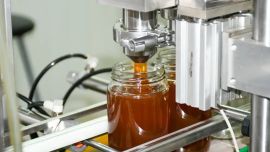Argentina has fixed the price of oil received by drillers at US$56, far below international levels, as it scrambles to stop inflation getting further out of control after this week’s currency devaluation, according to two people familiar with the matter.
Crude drillers in burgeoning shale patch Vaca Muerta will get US$56 a barrel until October 31. Argentine oil prices were already decoupled from global markets, but Thursday night’s decision means shale companies will receive 11 percent less than the US$63 at which local light crude was trading in the second quarter. The new price is also a big deviation from Brent, which is hovering at US$84.
Producers of heavier Escalante crude from other regions will get a US$5 discount on current prices, according to one of the people.
State-run YPF SA, which has the single biggest share of Vaca Muerta output, slumped more than three percent in New York trading, before paring some of the losses.
A spokesman for Economy Minister Sergio Massa declined to comment on the new barrel price, pointing only to the minister’s public remarks on Thursday freezing gasoline and diesel prices through October.
Argentina has frozen fuel prices at the pump after refiners, including market leader YPF, hiked by 12.5 percent this week in the wake of a slump in the peso.
Massa, the ruling party’s candidate in October’s presidential election, is trying to stop the full weight of the devaluation from immediately passing through to consumer prices across the board. Inflation in July was already running at 113 percent.
Oil producers are being made, in part, to bear the cost of capping fuel prices. That could be bad news for activity in Vaca Muerta, which Argentina wants to develop as quickly as possible to spur exports and bring in much-needed export dollars.
But interventions like this one have held back the region, whose crude production of roughly 300,000 barrels a day pales in comparison to rival shale formations in the US.
Massa promised drillers some benefits in return — the deferral of export taxes, quicker access to hard currency and, potentially, relief from some import taxes, one person said.
The decision recalls a controversial policy during the last presidential campaign in 2019, when the peso weakened and then-leader Mauricio Macri moved to control fuel prices.
Javier Milei, the libertarian front-runner in this election race, promises to free up Argentine oil markets completely.
by Jonathan Gilbert, Bloomberg




















Comments